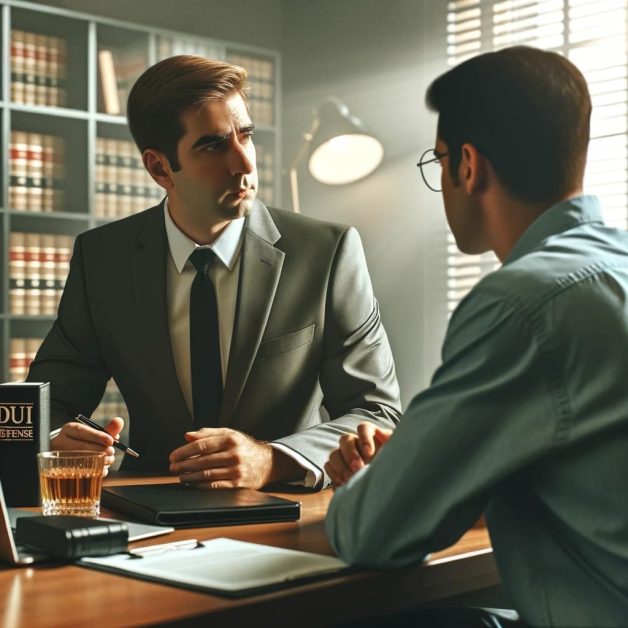Driving Under the Influence (DUI) charges are serious offenses that can have severe consequences, including hefty fines, license suspension, and even jail time. However, those accused of DUI have the right to defend themselves in court. Common defenses used in DUI cases can significantly impact the outcome, potentially leading to reduced charges or even dismissal. This article will explore various defenses that attorneys often use to challenge DUI charges.
Invalid Traffic Stop
One of the most effective defenses in Casos de DUI is challenging the validity of the initial traffic stop. According to the Fourth Amendment, law enforcement officers must have reasonable suspicion or probable cause to stop a vehicle. If an attorney can demonstrate that the officer lacked a valid reason for the stop, any evidence obtained as a result of that stop may be deemed inadmissible in court.
For instance, if a driver was pulled over for swerving within their lane but did not cross any lane markers, an attorney might argue that the officer did not have reasonable suspicion. Similarly, if a checkpoint stop did not follow the proper legal protocols, any subsequent Cargos por DUI could be challenged on those grounds.
Field Sobriety Test Issues
Pruebas de sobriedad sobre el terreno (FST) are commonly used by officers to establish probable cause for a DUI arrest. However, these tests are not foolproof and can be challenged on various grounds. Factors such as the suspect’s physical condition, weather conditions, and even the officer’s training and experience can affect the reliability of FST results.
For example, individuals with medical conditions like inner ear problems or injuries may struggle with balance, making it difficult to perform FSTs accurately. Additionally, uneven pavement or poor lighting can further compromise the test results. Attorneys often scrutinize these factors to undermine the validity of the FSTs and, by extension, the Cargo por DUI.
Breathalyzer Test Reliability
Breathalyzer tests are a cornerstone of DUI prosecutions, but they are not infallible. There are numerous ways to challenge the accuracy and reliability of breathalyzer results. These devices must be properly calibrated and maintained, and the officer administering the test must follow strict protocols.
An attorney might request maintenance records of the breathalyzer device to check for any lapses in calibration or servicing. Additionally, the defense may argue that the defendant’s medical conditions, such as gastroesophageal reflux disease (GERD) or diabetes, could have affected the breathalyzer results. Even the presence of certain substances in the mouth, like mouthwash or breath fresheners, can produce false positives.
Blood Test Contamination
While blood tests are considered more accurate than breathalyzer tests, they are not immune to challenges. The defense can argue that the blood sample was improperly collected, stored, or analyzed, leading to contamination or inaccurate results.
Attorneys often scrutinize the chain of custody of the blood sample to ensure that it was handled correctly at every stage. Any deviation from standard procedures, such as improper labeling or delayed analysis, can cast doubt on the test results. Additionally, the defense might question the qualifications and training of the personnel who conducted the test.
Rising Blood Alcohol Concentration (BAC)
The concept of rising BAC is another common defense in Casos de DUI. This argument is based on the fact that alcohol takes time to absorb into the bloodstream, and a person’s BAC can continue to rise for some time after they stop drinking. Therefore, a driver’s BAC at the time of the traffic stop might have been below the legal limit, even if it was above the limit when the test was administered.
To support this defense, an abogado might present evidence of the timeline of the defendant’s drinking, the type of alcohol consumed, and the time elapsed between the stop and the test. Expert testimony on alcohol absorption rates can also be crucial in making a convincing case.
Medical Conditions and Medications
Certain medical conditions and medications can mimic signs of intoxication or affect the results of Pruebas de alcoholemia. For example, hypoglycemia (low blood sugar) can cause symptoms like confusion, slurred speech, and unsteady gait, which an officer might mistake for intoxication. Similarly, certain medications can produce side effects that resemble drunkenness or interfere with breathalyzer readings.
An experienced DUI attorney will gather medical records and consult with healthcare professionals to establish a link between the defendant’s condition or medication and the observed symptoms. This can help create reasonable doubt about the accuracy of the DUI charge.
Improper Police Conduct
Improper conduct by law enforcement officers can also be a strong defense in DUI cases. This includes actions like failing to inform the suspect of their Derechos Miranda, coercing a confession, or using excessive force during the arrest. Any violation of the defendant’s rights can lead to the suppression of evidence or even dismissal of the charges.
For example, if an officer failed to inform the suspect of their right to remain silent and the right to an attorney, any statements made by the suspect during the arrest might be inadmissible in court. Similarly, if the officer used excessive force, the defense might argue that the arrest was unlawful.
Inaccurate or Misleading Evidence
In some cases, the evidence presented by the prosecution might be inaccurate or misleading. This can include video footage, witness statements, or even the results of forensic tests. An attorney will thoroughly investigate the evidence to identify any inconsistencies or errors that can be used to challenge the prosecution’s case.
For example, video footage from the officer’s dashcam or bodycam might show that the suspect was not driving erratically or that the field sobriety tests were conducted improperly. Witness statements can also be scrutinized for inconsistencies or biases that might undermine their credibility.
Alternative Explanations for Behavior
There are many reasons why a driver might exhibit behavior that an officer interprets as signs of intoxication. Fatigue, stress, or even the consumption of legal substances can all affect a person’s behavior and performance on sobriety tests.
An attorney might present evidence that the defendant was exhausted from a long day at work, under significant stress, or had taken a legal, over-the-counter medication that caused drowsiness or impaired motor skills. By providing a plausible alternative explanation for the observed behavior, the defense can cast doubt on the DUI charge.
Casos prácticos o ejemplos
Examining real-life case studies can provide valuable insights into how common defenses are used in DUI cases. For instance, in a well-documented case, a defendant was pulled over for weaving within their lane. The officer conducted a field sobriety test, which the defendant failed, leading to a DUI charge. However, the defense successfully argued that the initial stop was invalid because the officer lacked reasonable suspicion. The court agreed, and the DUI charge was dismissed.
Another case involved a defendant who had a medical condition affecting their balance. During the field sobriety test, the defendant’s inability to maintain balance was attributed to their condition rather than intoxication. The defense presented medical records and expert testimony to support this claim. As a result, the court found the field sobriety test results unreliable and dismissed the charges.
Análisis comparativo
Comparative analysis of DUI defenses across different jurisdictions can reveal variations in legal standards and practices. In some states, for example, the legal threshold for reasonable suspicion may be lower, making it easier for officers to justify traffic stops. Conversely, other states might have stricter requirements, offering more opportunities for defense attorneys to challenge stops.
Additionally, the acceptance of certain defenses, such as rising BAC or medical conditions, can vary. Some jurisdictions might be more receptive to arguments about medical conditions affecting test results, while others may require more rigorous proof. Understanding these differences is crucial for attorneys practicing in multiple states or for those handling cases involving out-of-state defendants.
Desglose detallado de las consecuencias jurídicas
Understanding the potential legal consequences of a DUI conviction is essential for defendants. DUI charges can lead to various penalties, including fines, license suspension, community service, mandatory DUI education programs, and even incarceration. The severity of these penalties often depends on factors such as the defendant’s BAC level, prior DUI convictions, and whether any aggravating circumstances, like causing an accident, were involved.
For instance, a first-time DUI offender with a BAC just above the legal limit might face minimal fines and a short license suspension. However, a repeat offender with a high BAC or involvement in an accident could face substantial fines, extended license suspension, and significant jail time. Understanding these potential outcomes can help defendants and their attorneys strategize the best defense approach.
Guía paso a paso con imágenes
A step-by-step guide on what to expect during a DUI arrest can be invaluable for defendants. Starting from the moment an officer initiates a traffic stop, the guide can outline each step of the process, including the administration of field sobriety tests, breathalyzer tests, and the booking process if arrested.
Visual aids, such as flowcharts or diagrams, can enhance understanding. For example, a flowchart could illustrate the sequence of events from the initial stop to the vista judicial, highlighting key decision points where a defense attorney can intervene. These visuals can demystify the process and help defendants feel more prepared and informed about what lies ahead.
Tecnología y herramientas
Advancements in technology have introduced new tools and techniques for both prosecution and defense in DUI cases. Breathalyzers and field sobriety test devices have become more sophisticated, but so have the methods for challenging their accuracy. For instance, defense attorneys now have access to software that can analyze breathalyzer data for inconsistencies.
Additionally, dashcams and bodycams provide valuable evidence that can be used to corroborate or dispute the officer’s account of events. Analyzing video footage can reveal whether the field sobriety tests were conducted properly or if the officer’s behavior during the stop was appropriate. These technological tools are crucial in building a robust defense strategy.
FAQ Section – Questions and Answers
Q: Can I refuse to take a prueba de alcoholemia?
A: Yes, you can refuse, but it often comes with automatic penalties, such as immediate license suspension. The refusal can also be used against you in court as evidence of guilt.
Q: What should I do if I’m pulled over for suspicion of DUI?
A: Remain calm, be polite, and cooperate with the officer. You have the right to remain silent and should consider doing so until you can consult with an attorney.
Q: How can a DUI conviction affect my life?
A: Beyond legal penalties, a DUI conviction can impact your job, insurance rates, and personal relationships. It can also result in a permanent criminal record, affecting future opportunities.
Cambios y tendencias legislativas
DUI laws are constantly evolving, with legislative changes aimed at enhancing road safety and addressing new challenges. For instance, recent trends include lower legal BAC limits and the implementation of stricter penalties for high BAC levels or repeat offenders. Some states have also introduced laws mandating the use of ignition interlock devices for convicted DUI offenders.
Monitoring these legislative changes is crucial for both defense attorneys and defendants. Staying informed about the latest laws and trends can help attorneys develop more effective defense strategies and advise their clients on how to comply with new regulations.
Consideraciones éticas
Defending a DUI case involves numerous ethical considerations. Attorneys must balance their duty to zealously defend their client with the broader implications of promoting public safety. Ensuring that the defense is based on factual evidence and legal principles, rather than exploiting technicalities, is essential for maintaining ethical standards.
Moreover, attorneys must consider the potential consequences of their defense strategies. For example, arguing for the dismissal of charges on a technicality might be legally valid, but it also raises questions about accountability and responsibility, especially if the defendant poses a genuine risk to public safety.
What Type of Attorney for This Type of Legality to Represent the Client and How to Find Them on Attorneys.Media
Choosing the right attorney to represent a client in a DUI case is crucial. Ideally, defendants should seek attorneys who specialize in DUI defense and have extensive experience in handling similar cases. These attorneys are familiar with the nuances of DUI laws and have a track record of successfully defending clients against such charges.
To find a qualified DUI attorney, defendants can start by visiting Abogados.Media. This platform provides a comprehensive directory of attorneys, categorized by their areas of specialization. Users can search for DUI defense attorneys in their region, read client reviews, and even watch informational videos to learn more about the attorneys’ expertise and approach.
When selecting an attorney, it’s important to consider their qualifications, experience, and reputation. Defendants should look for attorneys who are members of professional organizations like the National College for DUI Defense (NCDD) and have positive testimonials from previous clients. Initial consultations can also provide valuable insights into the attorney’s strategy and compatibility with the client’s needs.
Additionally, Attorneys.Media offers resources such as articles, guides, and videos that can help defendants understand their legal rights and the DUI defense process. This comprehensive approach ensures that defendants are well-informed and can make educated decisions when choosing legal representation.
By leveraging these resources, defendants can find the right attorney to advocate for their interests, navigate the complexities of DUI laws, and achieve the best possible outcome for their case.
Conclusión
Defending against a DUI charge requires a thorough understanding of the law and a meticulous examination of the evidence. The common defenses outlined in this article—challenging the validity of the traffic stop, field sobriety test issues, breathalyzer and blood test reliability, rising BAC, medical conditions, improper police conduct, inaccurate evidence, and alternative explanations for behavior—demonstrate the complexity and nuance involved in DUI cases.
Each defense strategy must be tailored to the specific circumstances of the case, and a skilled attorney can identify the most effective approach to protect their client’s rights and achieve the best possible outcome. Whether by highlighting procedural errors, questioning the accuracy of test results, or presenting alternative explanations, these defenses play a crucial role in ensuring a fair trial for those accused of DUI.
For more information on legal defenses and DUI laws, visit Abogados.Media for a comprehensive resource on related legal topics and expert guidance.
Attorneys.Media Video Document References
- Is Personal Injury Part of Your Law Practice?
- As an Attorney, How Are You Generating Content for Your Online Presence?
- How Can You Help Potential New Clients Get Their Questions Answered?
- How Do You Differentiate Yourself When Someone Looks Online for Help?
- How Do You Differentiate Yourself as a Criminal Defense Attorney?
- Have You Been Thinking About Video Marketing for Your Law Firm?
- Should Attorneys Use Video Marketing to Attract New Clients?
- What Do Potential Clients See When They Research Your Name Online?
- Cómo puede ayudarle Attorneys.Media








